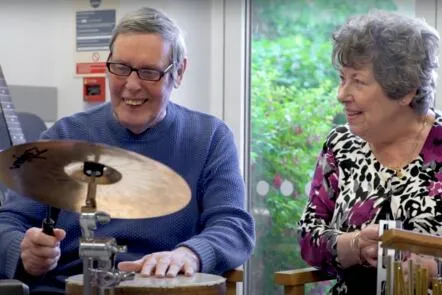
An Introduction to Music Therapy with Nordoff Robbins 
Gain an understanding of the fundamentals of music therapy with Nordoff Robbins, a pioneering approach to helping people with physical, emotional, and mental health issues. Learn the essential skills of a music therapist and explore the potential of music therapy. ▼
ADVERTISEMENT
Course Feature
![]() Cost:
Cost:
Paid
![]() Provider:
Provider:
Futurelearn
![]() Certificate:
Certificate:
No Information
![]() Language:
Language:
English
Course Overview
❗The content presented here is sourced directly from Futurelearn platform. For comprehensive course details, including enrollment information, simply click on the 'Go to class' link on our website.
Updated in [March 06th, 2023]
This course provides an introduction to music therapy with Nordoff Robbins. Participants will gain an understanding of a person-centered approach to music therapy, the key elements of how music therapy works, and how it can help in a variety of settings. Additionally, participants will explore their own relationship with music and learn about Nordoff Robbins' groundbreaking work. Through this course, participants will develop their abilities as a music therapist, learning how music therapy has evolved to meet the needs of our changing world, as well as the critical skills required to become a music therapist, such as the value of listening.
[Applications]
The application of this course can be seen in a variety of settings. It can be used to help individuals with mental health issues, physical disabilities, and learning difficulties. It can also be used to help people with communication difficulties, social skills, and emotional regulation. Additionally, it can be used to help people with stress management, relaxation, and creativity. Furthermore, it can be used to help people with physical rehabilitation, pain management, and end-of-life care. Finally, it can be used to help people with music performance, composition, and improvisation.
[Career Paths]
1. Music Therapist: Music therapists use music to help people of all ages and abilities to improve their physical, emotional, and mental health. Music therapists assess the needs of their clients and create individualized treatment plans that incorporate music activities such as singing, playing instruments, and improvisation. Music therapists are in high demand as the field of music therapy continues to grow and develop.
2. Music Therapy Educator: Music therapy educators are responsible for teaching music therapy students the skills and knowledge necessary to become successful music therapists. They provide instruction in music theory, music therapy techniques, and clinical practice. Music therapy educators must stay up to date on the latest research and trends in the field in order to provide the best education to their students.
3. Music Therapy Researcher: Music therapy researchers are responsible for conducting research on the effectiveness of music therapy interventions. They design and implement studies to investigate the impact of music therapy on physical, emotional, and mental health. Music therapy researchers must have a strong understanding of music theory, music therapy techniques, and clinical practice in order to design effective studies.
4. Music Therapy Administrator: Music therapy administrators are responsible for managing the day-to-day operations of music therapy programs. They oversee the budget, staff, and resources of the program and ensure that the program is meeting its goals. Music therapy administrators must have a strong understanding of music therapy techniques and clinical practice in order to effectively manage the program.
[Education Paths]
1. Bachelor of Music Therapy: This degree path provides students with the knowledge and skills necessary to become a professional music therapist. Students will learn about the history and theory of music therapy, as well as the practical application of music therapy in various settings. This degree path is becoming increasingly popular as more people recognize the potential of music therapy to help individuals with mental health issues, physical disabilities, and other challenges.
2. Master of Music Therapy: This degree path is designed for those who wish to specialize in music therapy and become a leader in the field. Students will learn advanced techniques and strategies for working with clients, as well as the ethical and legal considerations of music therapy. This degree path is becoming increasingly popular as more people recognize the potential of music therapy to help individuals with mental health issues, physical disabilities, and other challenges.
3. Doctor of Music Therapy: This degree path is designed for those who wish to become experts in the field of music therapy. Students will learn advanced techniques and strategies for working with clients, as well as the ethical and legal considerations of music therapy. This degree path is becoming increasingly popular as more people recognize the potential of music therapy to help individuals with mental health issues, physical disabilities, and other challenges.
4. Certificate in Music Therapy: This degree path is designed for those who wish to gain a basic understanding of music therapy and its applications. Students will learn about the history and theory of music therapy, as well as the practical application of music therapy in various settings. This degree path is becoming increasingly popular as more people recognize the potential of music therapy to help individuals with mental health issues, physical disabilities, and other challenges.
Course Syllabus
Introduction - Music and You
The importance of listening
The History of Nordoff Robbins
It takes two...
Nordoff Robbins work in groups and community settings
Course Provider

Provider Futurelearn's Stats at AZClass
Learn the fundamentals of music therapy, a groundbreaking approach to helping people with physical, emotional, and mental health issues, with Nordoff Robbins. This course will provide an overview of key elements of music therapy, such as how it works and how it can help in a variety of settings. You'll also learn about the groundbreaking work of Nordolph Robbins and develop your abilities as a music therapist. You'll learn how music therapy has evolved to meet the needs of our changing world, and the key skills needed to become a music therapist, such as the value of listening.
Discussion and Reviews
0.0 (Based on 0 reviews)
Explore Similar Online Courses

Create Swag Bag Inserts to Market your Business using Canva

Monitor and Log with Google Cloud Operations Suite

Python for Informatics: Exploring Information

Social Network Analysis

Introduction to Systematic Review and Meta-Analysis

The Analytics Edge

DCO042 - Python For Informatics

Causal Diagrams: Draw Your Assumptions Before Your Conclusions

Whole genome sequencing of bacterial genomes - tools and applications

Meditation

Mental Health First Aid Skills -


Start your review of An Introduction to Music Therapy with Nordoff Robbins